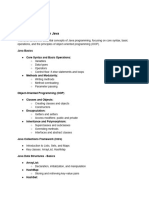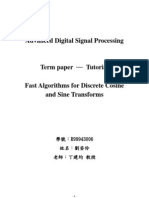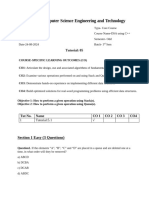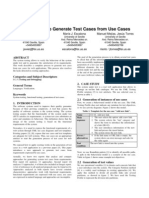0 ratings0% found this document useful (0 votes)
8 viewsJava Mastery Roadmap
The Java Mastery Roadmap outlines a comprehensive learning path for mastering Java, covering topics from basic syntax and control flow to advanced concepts like multithreading and frameworks. It emphasizes hands-on practice, real-world applications, and project-based learning to reinforce concepts. Key features of Java include platform independence, object-oriented design, and robust security.
Uploaded by
dolatkumar913Copyright
© © All Rights Reserved
We take content rights seriously. If you suspect this is your content, claim it here.
Available Formats
Download as PDF, TXT or read online on Scribd
0 ratings0% found this document useful (0 votes)
8 viewsJava Mastery Roadmap
The Java Mastery Roadmap outlines a comprehensive learning path for mastering Java, covering topics from basic syntax and control flow to advanced concepts like multithreading and frameworks. It emphasizes hands-on practice, real-world applications, and project-based learning to reinforce concepts. Key features of Java include platform independence, object-oriented design, and robust security.
Uploaded by
dolatkumar913Copyright
© © All Rights Reserved
We take content rights seriously. If you suspect this is your content, claim it here.
Available Formats
Download as PDF, TXT or read online on Scribd
You are on page 1/ 3
Java Mastery Roadmap
### 1. Introduction to Java
- What is Java? History and Features
- Why Learn Java? Real-World Applications
- Installing Java (JDK) and Setting Up an IDE (Eclipse, IntelliJ, VS Code)
- Writing Your First Java Program
### 2. Java Fundamentals
- Java Syntax and Structure
- Variables, Data Types, and Constants
- Operators (Arithmetic, Logical, Bitwise, etc.)
- Input/Output in Java
### 3. Control Flow Statements
- Conditional Statements (if-else, switch)
- Loops (for, while, do-while)
- Common Mistakes and Best Practices
### 4. Functions and Methods
- Defining and Calling Methods
- Method Overloading and Recursion
- Pass by Value in Java
### 5. Object-Oriented Programming (OOP) in Java
- Classes and Objects
- Constructors and Destructors
- Encapsulation, Inheritance, Polymorphism, Abstraction
- Static and Final Keywords
### 6. Arrays and Strings
- One-Dimensional and Multi-Dimensional Arrays
- String Manipulation and Methods
- StringBuilder and StringBuffer
### 7. Exception Handling and Debugging
- Types of Exceptions
- Try-Catch Blocks and Exception Hierarchy
- Custom Exceptions and Best Practices
### 8. Collections Framework
- Lists, Sets, and Maps (ArrayList, HashSet, HashMap, etc.)
- Iterators and Streams
### 9. File Handling and I/O Streams
- Reading and Writing Files
- Serialization and Deserialization
### 10. Advanced Java Concepts
- Multithreading and Concurrency
- Lambda Expressions and Functional Programming
- Networking in Java (Sockets, HTTP Requests)
- JDBC and Database Connectivity
### 11. Java Frameworks & Real-World Applications
- Introduction to Spring and Hibernate
- Building Web Applications with Java
- APIs and Microservices in Java
### 12. Projects and Hands-on Practice
- Building Mini Projects
- Solving Competitive Coding Challenges
- Contributing to Open Source
### How We Will Learn
1. Concept Explanation - Detailed breakdown with real-world examples.
2. Hands-on Practice - Exercises for every topic.
3. Common Mistakes - Avoiding pitfalls and debugging tips.
4. Quizzes & Challenges - Reinforce concepts.
5. Mini-Projects - Apply knowledge to build real applications.
### Lesson 1: What is Java?
Java is a high-level, object-oriented, platform-independent programming language developed by
James Gosling at Sun Microsystems in 1995.
It is widely used for developing web applications, enterprise software, Android apps, and more.
### Key Features of Java:
- Platform Independence - Write Once, Run Anywhere (WORA)
- Object-Oriented - Uses classes and objects
- Robust & Secure - Has built-in security features
- Multithreading - Supports concurrent execution
- Garbage Collection - Automatic memory management
### Task:
- Research real-world applications of Java (Android apps, banking systems, etc.).
- Install JDK and an IDE (Eclipse or IntelliJ IDEA).
You might also like
- Java Learning Roadmap For Beginners - KabiroskyNo ratings yetJava Learning Roadmap For Beginners - Kabirosky6 pages
- Get (Ebook) Learning Java - An Introduction to Real-World Programming with Java by Marc Loy, Patrick Niemeyer, Daniel Leuck ISBN 9781492056270, 1492056278 free all chapters100% (10)Get (Ebook) Learning Java - An Introduction to Real-World Programming with Java by Marc Loy, Patrick Niemeyer, Daniel Leuck ISBN 9781492056270, 1492056278 free all chapters65 pages
- Learning Java An Introduction to Real World Programming with Java Marc Loy instant download100% (3)Learning Java An Introduction to Real World Programming with Java Marc Loy instant download67 pages
- Instant Download (Ebook) Learning Java: An Introduction to Real-World Programming with Java by Marc Loy, Patrick Niemeyer, Daniel Leuck PDF All Chapters100% (11)Instant Download (Ebook) Learning Java: An Introduction to Real-World Programming with Java by Marc Loy, Patrick Niemeyer, Daniel Leuck PDF All Chapters65 pages
- Comprehensive Java Programming Course Mastering Syntax, Object-Oriented Concepts, and Mobile Applications Development (TAYLOR, JOHN R.) (Z-Library)No ratings yetComprehensive Java Programming Course Mastering Syntax, Object-Oriented Concepts, and Mobile Applications Development (TAYLOR, JOHN R.) (Z-Library)56 pages
- Croma Campus - Core Java Training CurriculumNo ratings yetCroma Campus - Core Java Training Curriculum8 pages
- Lesson 1 Introduction To Programming and JavaNo ratings yetLesson 1 Introduction To Programming and Java8 pages
- Java Programming for Beginners – Comprehensive NotesNo ratings yetJava Programming for Beginners – Comprehensive Notes6 pages
- Learning Java An Introduction to Real World Programming with Java Marc Loy - The ebook is ready for instant download and access100% (2)Learning Java An Introduction to Real World Programming with Java Marc Loy - The ebook is ready for instant download and access57 pages
- Java Programming Made Easy - Unl - Campbell, RyanNo ratings yetJava Programming Made Easy - Unl - Campbell, Ryan64 pages
- Wepik Unraveling The Wonders of Java A Comprehensive Guide 20231106101015jIBQNo ratings yetWepik Unraveling The Wonders of Java A Comprehensive Guide 20231106101015jIBQ16 pages
- Basic Java Developer Roadmap (2025 Edition)No ratings yetBasic Java Developer Roadmap (2025 Edition)5 pages
- Jeff P. Java. Learn Java Programming From Beginner to Professional 2024No ratings yetJeff P. Java. Learn Java Programming From Beginner to Professional 2024355 pages
- Learning Java An Introduction to Real World Programming with Java 5th Edition Marc Loy - The complete ebook version is now available for download100% (3)Learning Java An Introduction to Real World Programming with Java 5th Edition Marc Loy - The complete ebook version is now available for download58 pages
- CORE JAVA Syllabus: 1. Core Java Programming Introduction of JavaNo ratings yetCORE JAVA Syllabus: 1. Core Java Programming Introduction of Java9 pages
- The Definitive JavaScript Handbook: From Fundamentals to Cutting‑Edge Best PracticesFrom EverandThe Definitive JavaScript Handbook: From Fundamentals to Cutting‑Edge Best PracticesNo ratings yet
- Important_Questions_BISP_Mirpurkhas_10th_Class_Exams_2024_2025No ratings yetImportant_Questions_BISP_Mirpurkhas_10th_Class_Exams_2024_20253 pages
- 3. B.Ed (1.5 Years, 2.5 Years, 4 Years)No ratings yet3. B.Ed (1.5 Years, 2.5 Years, 4 Years)70 pages
- Alliance Access Products Family Compatibility MatrixNo ratings yetAlliance Access Products Family Compatibility Matrix1 page
- Reference For Unit 'Math': Procedures and FunctionsNo ratings yetReference For Unit 'Math': Procedures and Functions2 pages
- Integrated Cost and Scheduled Project Risk AnalysisNo ratings yetIntegrated Cost and Scheduled Project Risk Analysis11 pages
- Maintaining Bim Integrity in Structural Engineering OfficeNo ratings yetMaintaining Bim Integrity in Structural Engineering Office0 pages
- Rainflow Cycle Counting in Fatigue Analysis - Rainflow - CountingNo ratings yetRainflow Cycle Counting in Fatigue Analysis - Rainflow - Counting5 pages
- Name: Hendra Mahadina Email: Mobile: 085373926521 ABAP/BI/BO/HANA/Fiori ConsultantNo ratings yetName: Hendra Mahadina Email: Mobile: 085373926521 ABAP/BI/BO/HANA/Fiori Consultant5 pages
- Functional Forms of Regression Models: Damodar GujaratiNo ratings yetFunctional Forms of Regression Models: Damodar Gujarati10 pages
- An Approach To Generate Test Case From Use CaseNo ratings yetAn Approach To Generate Test Case From Use Case2 pages






































































































